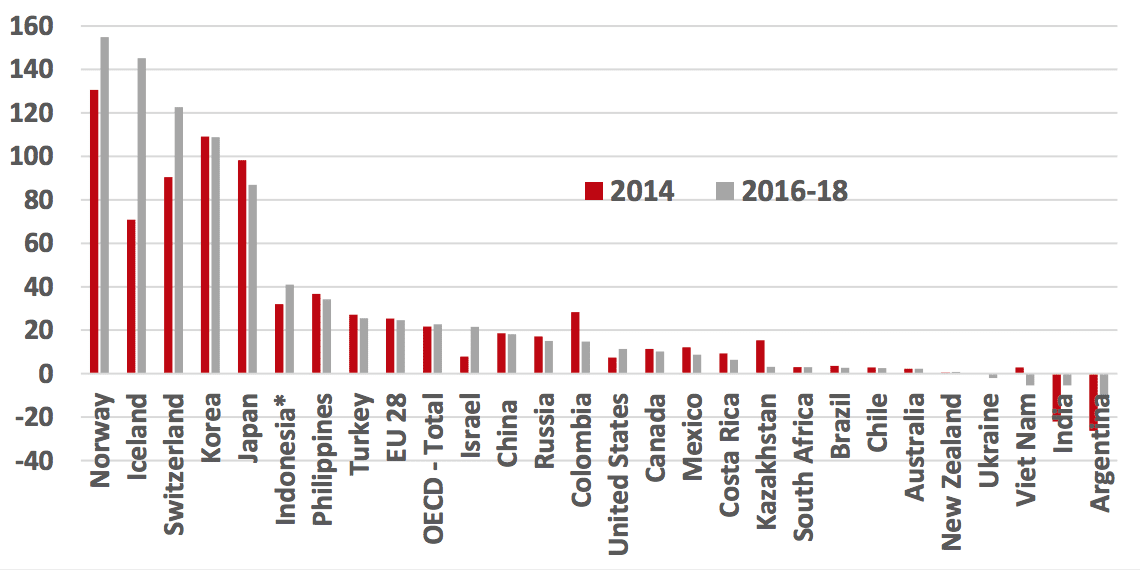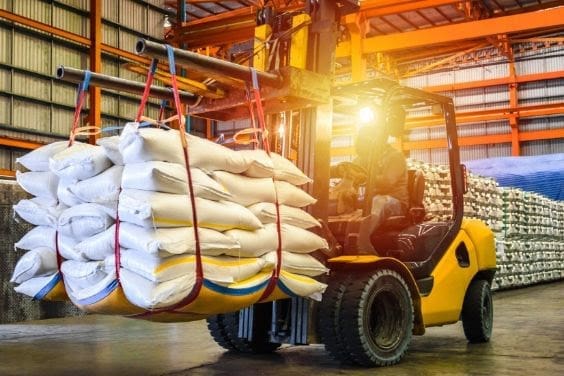A NEW AgriFutures Australia-funded study shows that farm subsidies and import barriers abroad lowered Australia’s net farm incomes by 15 per cent and reduced its farm exports by 29 per cent.
The report by Kym Anderson and Ernesto Valenzuela explores the impact of international agriculture subsidies on Australia, a non-subsidising agricultural export country.
The report shows that in the four years to 2018 the average nominal rate of assistance to farmers rose for all OECD countries by one-tenth (from 21pc to 23pc), and for the EU28 by slightly more (by one sixth, from 21pc to 25pc), between 2014 and 2016-18.

Aggregate agricultural nominal rate of assistance by country 2014 and 2016-18.
(% weighted average using value of production without assistance as weights)
*Indonesia refers to 2015 in place of 2016-18.
Source: OECD (2019).
The report shows that import barriers (tariffs and tariff rate quotas) remain the dominant protective policy instrument globally, but domestic support through budgetary transfers has grown in relative importance this century.
In 2014, such transfers accounted for a little over one quarter of the cost of these policies to Australian net farm incomes and agricultural exports.
All but one-quarter of the impact on Australian agriculture of global farm support measures are due to policies of the EU, Japan, China and Korea.
Australia’s red meat, wheat and dairy industries are the most adversely affected by farm policies abroad, but rice and cotton exports also are negatively impacted, especially relative to their production size.
The aggregate value of farmer assistance is highest in China and the EU, followed by Japan, the United States, Indonesia and Korea.
AgriFutures Australia Senior Manager, Business Development, Jen Medway said the findings would equip industries, policy makers and governments with the knowledge to negotiate better trade deals for Australian farmers, fishers and foresters.
“We’re increasingly connected with, and competing against, our farming peers across the globe and there’s no better time for the Australian agricultural community to reassess the impacts of global trade policies. Even small wins can have significant flow-on effects to producers on the ground.”
Report author Kym Anderson said the report’s key recommendations highlighted the important role of government trade negotiators in ensuring Australian agricultures’ global competitiveness.
“We shouldn’t solely focus on tariff barriers when negotiating free trade agreements, the research showed that domestic farm subsidies in competing countries are also significant impediments to Australia’s global competitiveness,” she said.
“We need to periodically review the global policy environment and take a proactive approach to leveling the international playing field via multilateral, regional and bilateral trade agreements.”
Ms Medway said Australian farmers “need a better deal”.
“But we need to have access to the most up to date information and empirical analysis to inform discussions with key trading partners,” she said.
“This study offers a global perspective on Australia’s agricultural export operations and an opportunity for our industries to re-double their efforts on the global policy reform stage.”
Download the full report: International agriculture subsidies and their impact on Australian agriculture


I don’t blame those countries that encourage local production, who wants to be dependent on others for food. Historically Britain was big importer but from the commonwealth so really from it’s own people. It’s way better to have local food and keep rural communities healthy than let them decay. Norway has a huge energy sector so subsidising farmers is a logical use of those funds and the rural communities are healthy and functioning.
Agrifutures Australia received $14.6m from the Australian Government to push an agenda first installed by the Hawke government in 1983.This agenda pursued by Canberra ever since has instilled a belief that subsidies and tariffs are bad. This condemnation of countries that protect and nurture their farmers are economic terrorists is a sad reflection of an economic policy that nurtures large corporate food processors and retailers at the expense of the family farmer. I have already Commented on Beef Central the perilous state of Australian agriculture ,but to go to my local fencing supplier and ask for Australian made steel post to be told they don’t make them in Australia anymore is a realization that Nationals ,Labor and Liberal parties has finally killed manufacturing.